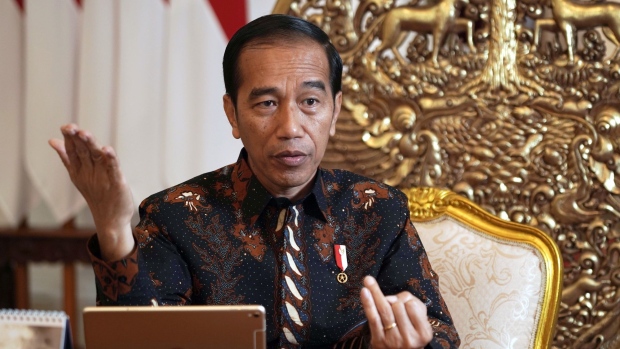Jul 12, 2019
Combative Jokowi Moves to Finally Unleash Indonesia's Potential
, Bloomberg News

(Bloomberg) -- Glancing at an iPad attached to a keyboard on a long wooden table in his palatial Jakarta office, Indonesian President Joko Widodo doesn’t look like your average political street brawler.
Commonly known as Jokowi, the 58-year-old leader of the world’s fourth most-populous nation routinely flashes a disarming smile while laying out his long-term economic vision for in a mix of English and Indonesian, the language that unites the diverse archipelago of 17,000 islands.
But behind the traditional Javanese politeness was a steely determination that underpinned his resounding election win in April. Exuding confidence, Jokowi said he’s learned from his first five years in office and is ready to take on political opponents who resist his efforts to overhaul the economy.
“I will do my best for this country,” Jokowi said in an interview Friday. “I have nothing to lose.”
Vote of Confidence
Jokowi came into office in 2014 riding a wave of support after his stint as Jakarta governor shook up a national political scene filled with the same old characters, mostly from the military, big business or powerful dynasties. He quickly got Indonesia’s finances in order, winning a credit-rating upgrade, though ran into trouble taking on entrenched interests that benefit from protectionism and endemic corruption.
Now with a larger mandate and more experience in the capital, Jokowi is pushing to make Indonesia more open to foreign investment in order to unleash the country’s potential and achieve growth rates closer to the 7% he promised -- but failed to reach -- in his first term. Politically he doesn’t have much time before he’s perceived as a lame duck: Already some potential candidates have started signaling they’ll run in the 2024 election.
So far, investors have given him a vote of confidence. Indonesia’s stock market has gained about 8% since he was declared the winner on May 21, while the currency is up 3% against the dollar.
In the interview, Jokowi brushed off concerns that reforms would run into staunch political opposition, pointing to the nearly two-thirds majority in parliament that his coalition won.
“Parties outside our coalition want to join us as well,” he said, adding he would be in a “stronger” position during his second term. He touted moves during the first term to build a range of infrastructure projects, which included a subway line in Jakarta that had been planned for at least three decades.
Balancing Interests
Still, a big coalition doesn’t necessarily bode well for sweeping changes. More parties in the ruling alliance increases the complexity of balancing various parochial interests, some of which could end up hurting from greater foreign competition and market-based pricing.
“I am skeptical that the president has as strong a hand as he suggests,” said Aaron Connelly, a research fellow at the International Institute for Strategic Studies in Singapore, adding that many lawmakers are more loyal to patronage networks than political parties. Courting those networks will thwart reform, he said, while taking them on “risks significant political instability.”
Jokowi has ambitious plans: He wants to build infrastructure at a faster pace while also investing more in health and education, all while maintaining fiscal discipline and keeping inflation under control. To do so, he’ll have to increase tax revenues that have lingered around 10%-12% of gross domestic product, one of the lowest rates in the region.
Perhaps most difficult will be adjusting stringent labor laws that make it difficult for companies to hire and fire employees. The severance pay for a worker in Indonesia with 10 years of tenure is about 95 weeks, according to the World Bank, ranking it among the world’s most generous and more than twice as much as Vietnam.
“Everyone knows that this is why the business community is not investing anymore in labor intensive industries,” said Sofjan Wanandi, the chief adviser to outgoing Vice President Jusuf Kalla. “Even Indonesian companies are going to Vietnam.”
While Indonesia’s jobless rate is at a 22-year low, about a third of the formal labor force is considered underemployed, working one to 34 hours a week. Another 74 million people are employed in the informal sector.
Jokowi said he’s hopeful the labor law will be changed by the end of the year, particularly as Indonesia looks to boost its attractiveness to manufacturers as the U.S.-China trade war risks reshaping global supply chains. He mentioned that both the unions and the business community aren’t completely happy with the government’s policies.
“They all complain, so we have to meet halfway,” the president said.
‘Modern Islam’
Jokowi’s ability to push through tough compromises on the economy will also signal whether he can ease social divisions that flared up in recent years, particularly over the role of Islam in the world’s most-populous Muslim country. Hardline groups have questioned his faith, and managed to push out one of his allies as Jakarta governor in 2017.
The president dismissed investor concerns about Islamism rising in Indonesia, saying religious attacks were “common in politics.”
“Indonesia is moderate Islam, modern Islam, tolerant Islam,” he said.
With the election out of the way, Jokowi’s focus is now on creating a legacy that will last far beyond the next five years -- in part by bringing in a new generation of talent.
“Let’s wait until October,” he said when asked about a possible reshuffle of his leadership team. “Many young people will fill the cabinet.”
To contact the reporters on this story: Karlis Salna in Jakarta at ksalna@bloomberg.net;Rieka Rahadiana in Jakarta at rrahadiana@bloomberg.net;Arys Aditya in Jakarta at aaditya5@bloomberg.net
To contact the editors responsible for this story: Daniel Ten Kate at dtenkate@bloomberg.net, Ruth Pollard
©2019 Bloomberg L.P.


